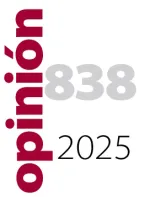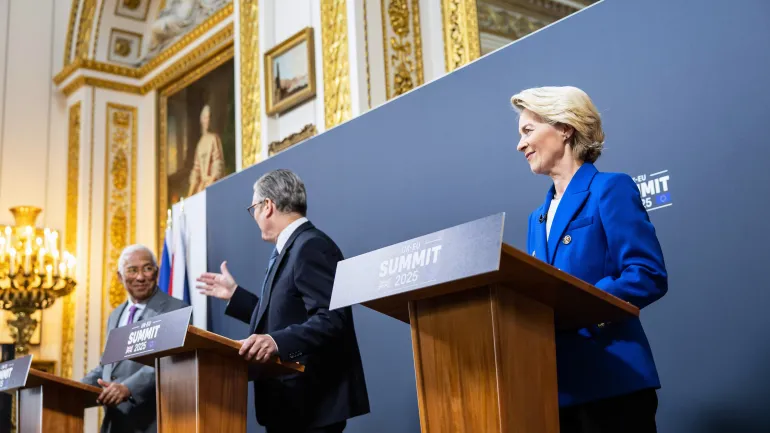The UK-EU reset is welcome but just a beginning


Five years after the United Kingdom officially left the European Union, geopolitical uncertainty has brought the countries on both sides of the channel closer. On 19 May 2025, the British government and the EU struck a “reset” deal to mark a new start for a post-Brexit era of bilateral cooperation. This agreement rests on three pillars: foreign and security policy, fisheries, and greater mobility for young people.
There is something quasi-inevitable in the reset in UK-EU relations agreed at Lancaster House on 19 th May. Inevitable because 55% of people in the UK polled today think Brexit was a mistake; inevitable because shutting off the UK from its largest market was doomed to fail; inevitable because in these times of increasing global insecurity fuelled by Donald Trump’s resort to a tariff war since he returned to the White House in January, the endless war in Ukraine and Israeli policy of ethnic cleansing in Gaza, Britain place on the map cannot be changed. Geography and history tell us it is part of the European continent with the shared economic, defence and cultural interests which that entails.
However much the Brexiters still try to control the narrative through the likes of the Daily Mail and the Daily Telegraph, which are becoming more dishonest by the day, hard facts cannot be denied. Boris Johnson says that Sir Keir Starmer has showed himself to be “the orange ball chewing manacled gimp of Brussels” but cynical sound bites cannot disguise the utter failure of the policies he pursued as prime minister. The leader of the far-right Reform UK, Nigel Farage, accuses the prime minister of “betraying British jobs and national priorities”, but he knows that the UK failed to power its way back to a global trade superpower status. Far from reducing immigration as the Brexiteers famously promised in 2016, net figures have increased threefold.
Let us not forget that the “hard Brexit” policy promoted by Boris Johnson was first and foremost a cynical way of getting rid of his predecessor in Downing Street, Theresa May. This tactical ploy was always xenophobic and economically illiterate. Hard Brexit has inflicted tens of billions of euros of damage on the British economy, curbed services, academic and cultural exchanges with the continent to the extent of preventing orchestras from EU countries and the UK touring across the Channel. It has led to the loss of many jobs, lowered the quality of public services and increased unemployment. Its absurdity is summed up in the £4.7bn the UK spent on implementing new border arrangements – which now have to be scrapped.
The reset between the UK and EU countries is welcome and overdue. Critics may argue that it is too little too late but that is to miss its strategic importance. It marks the date when Britain reverted to the pragmatism that has for centuries characterised its foreign policy. The fact that both sides are horse trading is welcome.
Britain secured the deal by allowing EU fishermen access to its waters for a longer period than initially envisaged, a sine qua non for the French and Spaniards which have important fishing industries and consume far more fish that the British. That concession opened the way for a wide-ranging deal that includes the removal of much red tape for British farm exports and energy trading. The value of food and drink exports is expected to rise by 20% from its figure of Sterling 14bn in 2024. Exports of this sector declined by a third after Brexit.
The agreement opens the way to Britain’s important defence sector gaining access to £150bn of an EU fund of cheap loans backed by the EU budget for the purchase and development of weapons. Britain is, with France the only European country to have nuclear weapons and a seat on the UN Security Council. At a time, other EU countries are re arming, the Lancaster House agreement allow for closer co-ordination of arms procurement and defence policies.
The EU was hoping for a more generous and open scheme where youth mobility is concerned – the system under which young people from the UK and EU countries can live and work more easily in their respective jurisdictions. But the UK insisted on one that is capped and limited in duration. It refused to accept that EU students at British universities be allowed to benefit from the lower university fees paid by their domestic British counterparts. Part of the reason here is that more EU students wish to study in UK universities than British students in European ones. Starmer’S caution here is explained by the hard-hitting campaign against a reset led by an opposition which succeeded in conflating foreign student numbers and illegal immigrants in the minds of many British voters.
Since 2016, Brexiter leaders in politics and the media have formed themselves into a cult of believers in a fantasy where Britain, unshackled from Brussels would regain the influence it enjoyed a century ago. Many of their erstwhile supporters have discovered that Britain no longer rules the waves in the words of the old imperial song. It can no longer rely on the United States which under Trump has become overtly hostile to its European allies. In the Middle East, British, French and Spanish leaders understand that Israel’s brutal war on Gaza is a diplomatic disaster for Europe quit a part from reminding its citizens of the horrors of the Holocaust.
One major disappointment was that the Security and Defence Pact offered little of substance beyond a proliferation of structures for dialogue which will do little to increase Europe’s self-reliance. Can the EU overcome the rigidity that characterised its former Brexit negotiator Michel Barnier? Will it dare to blur the distinction between member and non-member when it comes to security cooperation? In short will it accept that Europe means something broader than the EU? Demographic decline without further mass immigration and lack of relative innovation are the twin challenges that confront Europe today. The reset is welcome but it is worth remember, in another context, Jose Luis Borges’ aphorism of “two bald men fighting over a comb.”
Keywords: UK, EU, reset, Brexit, cooperation, Lancaster House, Starmer, Farage, Security and Defence, mobility, fisheries
All the publications express the opinions of their individual authors and do not necessarily reflect the views of CIDOB or its donors.
Image: © European Union, 2025